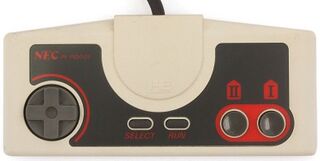Difference between revisions of "Pad"
From NEC Retro
m (Text replacement - "| madefor=" to "| type=Controller | madefor=") |
|||
| Line 5: | Line 5: | ||
| title= | | title= | ||
| maker=[[NEC Home Electronics]] | | maker=[[NEC Home Electronics]] | ||
| + | | type=Controller | ||
| madefor=[[PC Engine]] | | madefor=[[PC Engine]] | ||
| releases={{releasesPCE | | releases={{releasesPCE | ||
Revision as of 07:20, 2 April 2023
This short article is in need of work. You can help NEC Retro by adding to it.

| ||||||||||
| Pad | ||||||||||
|---|---|---|---|---|---|---|---|---|---|---|
| Made for: PC Engine | ||||||||||
| Manufacturer: NEC Home Electronics | ||||||||||
| Type: Controller | ||||||||||
|
The PC Engine Pad (PCエンジン専用パッド) is the standard-issue controller that came bundled with the original launch model of the PC Engine console.
It is functionally identical to the first player's controller on Nintendo's Family Computer console, with a directional pad on the left side (which uses a circular disc shape of instead of Nintendo's cross design), two main action buttons on the right (which were labelled Ⅰ and Ⅱ from right to left, rather than following Nintendo's A and B scheme), and two auxiliary buttons on the center labelled SELECT and RUN (the latter being the PC Engine's counterpart to Nintendo's "Start" button).
However, the PC Engine controller differs from its Famicom counterpart in the sense that it was detachable from the console itself, making it much closer to the western NES controller (unlike the NES though, the PC Engine only has one controller port as standard, requiring a Multitap for additional controllers). The Pad also has a soft reset function that can be triggered in most games by pressing SELECT and RUN simultaneously, as the console itself lacked a hard reset button.
In addition to its inclusion with the console, the standard Pad was also sold separately for players who needed a replacement controller or an additional one for multiplayer games. Because the Turbo Pad (which added two turbo switches) was sold following the system's launch alongside the standard Pad and the price difference between them was considerably minimal (with the Turbo Pad only costing 200 yen more), most Japanese consumers opted to purchase the Turbo Pads for their additional controllers over the standard Pads. This resulted in NEC Home Electronics quickly phasing out the original Pads in favor of making the Turbo Pad into the de-facto controller for the system, ironically turning the non-turbo controllers into rare novelties.
Physical scans
| PC Engine, JP |
|---|
|